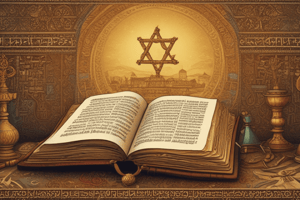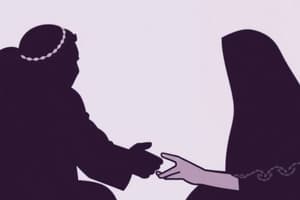Podcast
Questions and Answers
Until which day do ספרדים recite סליחות, starting from ב’ אלול?
Until which day do ספרדים recite סליחות, starting from ב’ אלול?
- ערב ראש השנה
- ראש השנה
- יום טוב שני של ראש השנה
- יום הכפורים (correct)
If ראש השנה falls on a Thursday or Shabbat, when do אשכנזים begin reciting סליחות?
If ראש השנה falls on a Thursday or Shabbat, when do אשכנזים begin reciting סליחות?
- ראש חודש אלול
- The Monday after ראש השנה
- ב’ אלול
- The Sunday before ראש השנה (correct)
Which action is required before learning תורה?
Which action is required before learning תורה?
- Blowing the שופר
- Saying ברכות התורה (correct)
- Reciting סליחות
- Performing התרת נדרים
From when do אשכנזים start blowing the שופר?
From when do אשכנזים start blowing the שופר?
What is the minimum number of people required to say something considered דבר שבקדושה?
What is the minimum number of people required to say something considered דבר שבקדושה?
When is an individual permitted to recite the י"ג מדות?
When is an individual permitted to recite the י"ג מדות?
What is the purpose of התרת נדרים?
What is the purpose of התרת נדרים?
What is the function of עירוב תבשילין?
What is the function of עירוב תבשילין?
What items are customarily used for עירוב תבשילין?
What items are customarily used for עירוב תבשילין?
Explain the concept that ברכות should be עובר לעשייתן.
Explain the concept that ברכות should be עובר לעשייתן.
Which scenario best exemplifies the principle of 'אין טוחן אחר טוחן' (no grinding after grinding) in the context of Shabbat?
Which scenario best exemplifies the principle of 'אין טוחן אחר טוחן' (no grinding after grinding) in the context of Shabbat?
According to the laws of Shabbat, what is the primary distinction between permissible and forbidden sorting ()בורר?
According to the laws of Shabbat, what is the primary distinction between permissible and forbidden sorting ()בורר?
Which activity would be considered ''לש (kneading) and therefore prohibited on Shabbat?
Which activity would be considered ''לש (kneading) and therefore prohibited on Shabbat?
Which of the following best illustrates the violation of the prohibition of ''בשול (cooking) on Shabbat?
Which of the following best illustrates the violation of the prohibition of ''בשול (cooking) on Shabbat?
Which action constitutes the ''מלאכה (prohibited labor) of ''זורה (winnowing) on Shabbat?
Which action constitutes the ''מלאכה (prohibited labor) of ''זורה (winnowing) on Shabbat?
Which scenario accurately describes the ''מלאכה of 'מפרק/'דש (threshing) which is prohibited on Shabbat?
Which scenario accurately describes the ''מלאכה of 'מפרק/'דש (threshing) which is prohibited on Shabbat?
What is the key difference between 'מלאכת אוכל נפש' and 'מלאכת עבודה' in the context of Shabbat and Yom Tov?
What is the key difference between 'מלאכת אוכל נפש' and 'מלאכת עבודה' in the context of Shabbat and Yom Tov?
What is the critical distinction between 'מזיד' and 'שוגג' concerning violations of Shabbat?
What is the critical distinction between 'מזיד' and 'שוגג' concerning violations of Shabbat?
When lighting Yom Tov candles, which action should ideally precede the other?
When lighting Yom Tov candles, which action should ideally precede the other?
Within the context of Halacha, what is the practical duration defined by the term 'Toch K’dei Dibbur'?
Within the context of Halacha, what is the practical duration defined by the term 'Toch K’dei Dibbur'?
During Aseres Yemei Teshuva, if one forgets to say 'HaMelech Hakadosh' in the Amidah and realizes this mistake within 'Toch K’dei Dibbur', what is the Halachic ruling?
During Aseres Yemei Teshuva, if one forgets to say 'HaMelech Hakadosh' in the Amidah and realizes this mistake within 'Toch K’dei Dibbur', what is the Halachic ruling?
Regarding hearing the Shofar on the first day of Rosh Hashanah, is this obligation classified as a Mitzvah D’Oraisa or a Mitzvah D’Rabbanan?
Regarding hearing the Shofar on the first day of Rosh Hashanah, is this obligation classified as a Mitzvah D’Oraisa or a Mitzvah D’Rabbanan?
What does the Halachic concept of 'Shomea K’oneh' imply?
What does the Halachic concept of 'Shomea K’oneh' imply?
Which scenario exemplifies a 'Hefsek' (interruption) according to Halacha?
Which scenario exemplifies a 'Hefsek' (interruption) according to Halacha?
What is the defining characteristic of a 'Mitzvas Aseh Shehazman Grama'?
What is the defining characteristic of a 'Mitzvas Aseh Shehazman Grama'?
Why are women generally exempt from Mitzvot Aseh Shehazman Grama, such as the mitzvah of Shofar?
Why are women generally exempt from Mitzvot Aseh Shehazman Grama, such as the mitzvah of Shofar?
Explain the statement: 'Gadol Hamitzaveh V’Oseh Yoser MiMi She’aino Mitzaveh V’Oseh' in practical terms.
Explain the statement: 'Gadol Hamitzaveh V’Oseh Yoser MiMi She’aino Mitzaveh V’Oseh' in practical terms.
According to Jewish Law, what category of labor does 'Kotzer' fall under, and what does it entail?
According to Jewish Law, what category of labor does 'Kotzer' fall under, and what does it entail?
Flashcards
What is 'Borer'?
What is 'Borer'?
Separating the bad from the good.
What is 'Lash' (Kneading)?
What is 'Lash' (Kneading)?
Combining small particles into a solid using a liquid.
What is 'Bishul' (Cooking)?
What is 'Bishul' (Cooking)?
Using heat to make food more edible.
What is 'Tochan' (Grinding)?
What is 'Tochan' (Grinding)?
Signup and view all the flashcards
What is 'Zoreh' (Winnowing)?
What is 'Zoreh' (Winnowing)?
Signup and view all the flashcards
What is 'Dash' (Threshing)?
What is 'Dash' (Threshing)?
Signup and view all the flashcards
What is 'Me'amer' (Gathering)?
What is 'Me'amer' (Gathering)?
Signup and view all the flashcards
What is 'Zore'a' (Sowing)?
What is 'Zore'a' (Sowing)?
Signup and view all the flashcards
תוך כדי דיבור
תוך כדי דיבור
Signup and view all the flashcards
שומע כעונה
שומע כעונה
Signup and view all the flashcards
מצות עשה שהזמן גרמא
מצות עשה שהזמן גרמא
Signup and view all the flashcards
גדול המצווה ועושה יותר ממי שאינו מצווה ועושה
גדול המצווה ועושה יותר ממי שאינו מצווה ועושה
Signup and view all the flashcards
נֵר ׁשֶ שָ בַת
נֵר ׁשֶ שָ בַת
Signup and view all the flashcards
חורש
חורש
Signup and view all the flashcards
פסיק רישיה
פסיק רישיה
Signup and view all the flashcards
ָדבָר ֶׁש אֵ ינֹו מִ ת ַּכוֵן
ָדבָר ֶׁש אֵ ינֹו מִ ת ַּכוֵן
Signup and view all the flashcards
קוצר
קוצר
Signup and view all the flashcards
אֹוכֵל מִ ּתֹוך ּפְ סֹולֶ ת
אֹוכֵל מִ ּתֹוך ּפְ סֹולֶ ת
Signup and view all the flashcards
When do Ashkenazim start saying Selichot?
When do Ashkenazim start saying Selichot?
Signup and view all the flashcards
What are Birchot HaTorah?
What are Birchot HaTorah?
Signup and view all the flashcards
What is a 'Davar Shebekedusha' quorum?
What is a 'Davar Shebekedusha' quorum?
Signup and view all the flashcards
Are the 13 Attributes (Yud Gimmel Middot) a Davar Shebekedusha?
Are the 13 Attributes (Yud Gimmel Middot) a Davar Shebekedusha?
Signup and view all the flashcards
What is Hatarat Nedarim?
What is Hatarat Nedarim?
Signup and view all the flashcards
What does Eruv Tavshilin allow?
What does Eruv Tavshilin allow?
Signup and view all the flashcards
What's the basic idea of an Eruv Tavshilin?
What's the basic idea of an Eruv Tavshilin?
Signup and view all the flashcards
What's used for the Eruv Tavshilin?
What's used for the Eruv Tavshilin?
Signup and view all the flashcards
How do you make the Eruv Tavshilin?
How do you make the Eruv Tavshilin?
Signup and view all the flashcards
What's 'Oiver L'Asiyatan'?
What's 'Oiver L'Asiyatan'?
Signup and view all the flashcards
Study Notes
- ספרדים start reciting סליחות from ב' אלול until יום הכפורים.
- אשכנזים start reciting סליחות the Sunday before ראש השנה, if ראש השנה falls out on Thursday or Shabbat.
- Before learning תורה, one needs to say ברכות התורה.
- אשכנזים start blowing the שופר from ראש חודש אלול.
- Ten people are needed to say something considered דבר שבקדושה.
- י"ג מדות considered a דבר שבקדושה.
- יחיד is allowed to recite the י"ג מדות only if one says them with their proper טעמים.
- התרת נדרים means absolving an oath.
- התרת נדרים is done on ערב ראש השנה.
- Syrian custom to do התרת נדרים three times: 40 days before ראש השנה, prior to ראש השנה, and prior to יום הכפורים.
- עירוב תבשילין allows cooking/preparing for Shabbat on a Friday which is a יום טוב.
- עירוב תבשילין involves preparing food on ערב יום טוב for Shabbat to continue cooking for Shabbat on יום טוב.
- The literal translation of the word "ערב" is "mixture."
- Customary to use bread and a cooked food for עירוב תבשילין.
- One needs to put aside a כזית of cooked food and a כביצה of bread for עירוב תבשילין.
- Best time to cook from יום טוב to Shabbat is as early as possible on Friday with enough time for the food to be ready to be eaten before Shabbat.
- Make the עירוב תבשילין after the cooked and baked food: first say a ברכה of על מצות עירוב then say בדין עירובא וכו.
- Understanding the meaning of בדין עירובא is not imperative. If one does not understand it, they should say it in a language they understand.
- Besides cooking from יום טוב to Shabbat, the עירוב תבשילין permits one to make one's bed, wash dishes, and roll the Torah for the proper Torah reading.
- When performing a מצוה, the concept is that ברכות should be said עובר לעשייתן - before the action of the מצוה.
- When lighting יום טוב candles, one should say the ברכה before lighting the candles.
- תוך כדי דבור means the time it takes to say שלום עליך רבי.
- If one forgot to say המלך הקדוש during עשרת ימי תשובה and realized their mistake, one can correct their mistake and continue the עמידה within תוך כדי דיבור.
- Hearing the שופר on the first day of ראש השנה is a מצוה דאורייתא.
- שומע כעונה means when listening to someone say a ברכה and having in mind to fulfill their obligation, it is as if they said those words themselves.
- הפסק is an interruption, like saying a ברכה and then talking (interrupting) before eating.
- Men are obligated to hear the Shofar Blasts.
- מצות עשה שהזמן גרמא means a positive, time-bound מצוה
- Women are not obligated in מצות שופר because it is a מצות עשה שהזמן גרמא.
- גדול המצווה ועושה יותר ממי שאינו מצווה ועושה means one who is obligated in a מצוה receives a greater reward for fulfilling it than someone who performs it but is not obligated to do so.
- While it can be a good idea for women to hear שופר, it should not be at the expense of bringing her little children to shul and causing a disturbance.
- One is not allowed to prepare from the first day of ראש השנה to the second.
- נר ששבת is a candle that was kindled before יום הכפורים and is still burning after יום הכפורים is over.
- On מוצאי יום הכפורים one needs to use for הבדלה a נֵר שֶׁשֶׁבַת or a candle that was kindled from a נר ששבת.
- The first מלאכה of the ל"ט מלאכות– is חורש (plowing).
- פסיק רישיה is doing an action that will definitely cause a side effect
- Example: opening a refrigerator door will cause the light to go on.
- דָבָר שֶׁאֵינוֹ מִתְכַּוֵן is doing an action on Shabbat that may or may not result in a מלאכה
- Example: dragging a chair across the lawn.
- One is allowed to walk on grass on Shabbat since there is no guarantee that the grass will uproot.
- The מלאכה of קוצר means removing produce from where it grew.
- One is not allowed to lean on a tree on Shabbat.
- מעמר is raking leaves to form a compost pile and/or collecting fruits into one's pockets.
- אוֹכֵל מִתּוֹךְ פְּסוֹלֶת means separating the good from the bad.
- One is allowed to sort on שבת separating good from the bad, by hand and for now.
- אין טוחן אחר טוחן refers to crumbling bread into small crumbs.
- When something is cut too thin regarding טוחן, the exact size is unclear.
- לש is kneading - combining particles into a solid/semisolid by means of a liquid medium.
- בשול is cooking - to use heat to make the substance more edible or potable than before.
- מרקד is sifting, separating a mixture by means of a sifting device.
- טוחן is grinding, reducing an object to small particles whereby it becomes suitable for a new use.
- בורר is sorting, separating the bad from the good.
- זורה is winnowing, using the natural force of the wind to separate the bad from the good.
- דש/מפרק extraction of fruit, vegetable or earth-grown commodity from its natural inedible shell, peel or similar attachment.
- מעמר is the collection or combining of scattered fruits, produce or any other substance in the place of their growth into a pile.
- the מלאכה of זוֹרֵעַ involves the initiation or promotion of plant growth in any way.
- מצות עשה is a positive מצוה, where the Torah commands us to do something, like give צדקה.
- מצות לא עשה is a negative מצוה, where the Torah commands us not to do something, like don't eat non-Kosher animals.
- שמירת שבת includes both a מצות לא תעשה and a מצות עשה.
- מלאכת עבודה is work not for preparing food for human consumption.
- מלאכת אוכל נפש is work for preparing food for human consumption.
- On שבת, the Torah prohibits מלאכת עבודה and מלאכת אוכל נפש.
- On יום טוב the Torah prohibits only מלאכת עבודה.
- Cooking is an example of מלאכת אוכל נפש.
- מזיד means intentionally doing an action with full knowledge that this is אסור.
- שוגג means intentionally doing an action without knowing that the action is prohibited.
- Someone who knows that one cannot do מלאכה today because it's Shabbat but did not know the מלאכה carries a punishment of כרת.
- The punishment for doing a מלאכה on שבת on purpose not in front of two witnesses is כרת.
- The punishment for doing a מלאכה on שבת on purpose in front of two witnesses and was warned beforehand is סקילה.
- The punishment for doing a מלאכה on שבת by accident (שוגג) is to bring a קרבן.
- There are 39 אבות מלאכה we are commanded to keep on Shabbat.
- מומר is a person who is known to not keep a certain מצוה and is only if he commits the sin with the intent of angering God.
- Example: a person continually cuts his פאות.
- מומר לכל התורה is one who rejects the whole Torah.
- One is not allowed to eat the meat of an animal that was slaughtered by a מחלל שבת בפרהסיא.
- Violating Shabbat is severe because it's a denial of HaShem's creation of the world, akin to עבודה זרה.
- The two מצות that are equivalent to all other מצות are Shabbat and עבודה זרה.
- Someone who violates Shabbat is considered an עכו"ם when he violates it in public without any embarrassment.
Studying That Suits You
Use AI to generate personalized quizzes and flashcards to suit your learning preferences.
Related Documents
Description
Overview of Jewish laws (halakha) and customs related to Selichot, blowing the Shofar, blessings before Torah study, the requirement of a minyan for saying something of kedusha, and the laws of Eruv Tavshilin. Additionally, the laws of hatarat nedarim are discussed.




